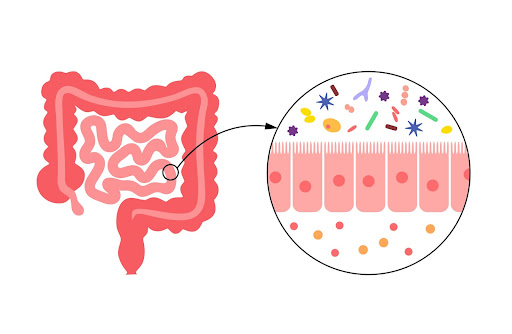Have you tried everything, and you still experience fatigue, joint pain, and GI issues including constipation, dry, thinning skin, and hair loss?Are you cold and sore all the time? Have you gotten your thyroid levels checked, and come back with a normal result? Have you heard of hypothyroidism? What about Hashimoto’s disorder? This can all be very frustrating and confusing. How can we get to the root of these symptoms and rule out what they’re not? If you’re looking for more information on what is good for the thyroid and how to support it, then you’re in the right place.
Your thyroid, a butterfly-shaped gland located in your neck, plays many important roles in your health. The thyroid produces hormones that regulate growth, development, and reproductive health. It is also vital in regulating many of our internal processes, such as body temperature, heart rate, and even brain function. The way your thyroid regulates all these bodily processes is through hormones. Hormones are chemical messengers that tell areas of your brain and body what to do when to do it, and how. The hormones produced by the thyroid gland are called triiodothyronine, otherwise known as T3, and thyroxine, also called T4. In addition to these hormones produced by the thyroid, the levels of antibodies called thyroid peroxidase (TPO), anti-thyroglobulin (TG), and thyroid binding globulin (TBG) are important to understand as far as thyroid functioning goes.
The pituitary gland in your brain produces a hormone called “Thyroid Stimulating Hormone or TSH for short. This hormone is created by the brain when it senses that T3 or T4 levels are low.
Sometimes the thyroid does not produce enough thyroid hormones. Having an underactive thyroid is referred to as hypothyroidism. On the flip side, a thyroid gland that is overly active produces these hormones in excess and is referred to as hyperthyroidism. Oftentimes, thyroid disorders can be aggravated by a variety of issues that affect both the adrenals and the thyroid, including chronic stress, environmental toxins, allergies/intolerances, infections, and dysbiosis
There are five common causes of hypothyroidism. They include pituitary dysfunction, inadequate conversion of T4 into T3, which is usually due to chronic stress, and elevated cortisol levels in the adrenals, which inhibit the conversion of T4 into T3. Hypothyroidism can also be caused by excess or decreased TBG (thyroid binding globulin), which is caused by excess estrogen, or high testosterone levels (in women) respectively. Finally, thyroid resistance can also be responsible for hypothyroidism.
Hashimoto’s vs. Other Thyroid Disorders
So what about Hashimoto’s? Let’s break down the difference between Hashimoto’s disorder and hypothyroidism.
Remember that hypothyroidism occurs when the thyroid is underactive and produces too little thyroid hormone. Although Hashimoto’s disorder is one of the most common causes of hypothyroidism, having hypothyroidism does not necessarily mean you have Hashimoto’s disorder.
Some common symptoms of hypothyroidism are:
- Fatigue
- Weight gain
- Difficulty concentrating, depression, memory problems
- Dry or thinning hair, skin, and nails
- Trouble tolerating cold temperature
- Joint and muscle pain
- Constipation

Hashimoto’s is an autoimmune disorder that affects the thyroid gland, causing it to become underactive. The immune system of someone with Hashimoto’s chronically attacks its own cells, preventing the adequate release of T3 and T4 hormone levels. Along with this, the antibodies (TPO and TG) of someone with Hashimoto’s will be elevated. This constant immune attack leads to chronic inflammation in the body, which leads to a chain of adverse health effects.
Some common symptoms of Hashimoto’s disorder are:
- Fatigue
- Weight gain
- Depression
- Hair loss
- Sensitivity to cold temperatures
- Irregular menstrual cycle
- Low libido
- Dry skin
- Constipation
- Muscle aches
- Visible goiter in the neck
When these symptoms pop up out of the blue, it can be very uncomfortable. For people with Hashimoto’s, this is called a flare-up.
You’ll notice that the symptoms of Hashimoto’s are incredibly similar to the symptoms of hypothyroidism. Because of this, if you suspect you may have either disorder, it is important to get comprehensive testing done. Most medical practitioners test for TSH and T4 levels, but they miss the T3 and antibody levels altogether. Let’s walk through all the tests that can tell you whether your thyroid is functioning properly. These tests can give you and your healthcare provider clues about whether you may have hypothyroidism or Hashimoto’s disorder.
Testing for Hashimoto’s

TSH (thyroid stimulating hormone) testing measures how much thyroid stimulating hormone is in the blood. High TSH means not enough thyroid hormone is being produced and can be indicative of hypothyroidism or Hashimoto’s. T3 and T4 tests measure the amount of these respective hormones in the blood, and high levels of these hormones may be indicative of hyperthyroidism. Doctors often combine a TSH and a T4 test to measure how well a patient’s thyroid is functioning. However, in order to find out if you truly have Hashimoto’s, it is important to have more thorough testing done, as these tests may not be enough. The Comprehensive Thyroid Assessment Test by Genova analyzes these hormone levels along with thyroid antibody levels, to give you a clearer picture of your thyroid health.
Hashimoto’s & Gluten – Leaky Gut?
 Surprisingly, thyroid health is directly impacted by gut health. One common issue that many people experience is a “leaky gut”. A leaky gut is essentially where the tight junctions between cells in the gut lining start to loosen, thus letting certain nutrients and cells through the gut lining which are not supposed to cross that barrier. This causes inflammation, dysbiosis, pathogen invasion (parasites), and a host of other issues. Leaky gut can be caused by gluten, for instance, especially in those who have a gluten sensitivity, such as Celiac disease. Additionally, thyroid autoimmune disorders have been linked 10 times more often to individuals diagnosed with Celiac, or gluten intolerance, than those without it.
Surprisingly, thyroid health is directly impacted by gut health. One common issue that many people experience is a “leaky gut”. A leaky gut is essentially where the tight junctions between cells in the gut lining start to loosen, thus letting certain nutrients and cells through the gut lining which are not supposed to cross that barrier. This causes inflammation, dysbiosis, pathogen invasion (parasites), and a host of other issues. Leaky gut can be caused by gluten, for instance, especially in those who have a gluten sensitivity, such as Celiac disease. Additionally, thyroid autoimmune disorders have been linked 10 times more often to individuals diagnosed with Celiac, or gluten intolerance, than those without it.
Gluten, which is found in grains such as wheat, barley, and rye, can cause the breakdown of the gut lining and further impose health issues related to nutrient deficiency, such as anemia or hypothyroidism. The symptoms of celiac disease, non-celiac gluten sensitivity, and Hashimoto’s can be conflated with one another and can confuse your diagnosis. This is why food intolerance and thyroid hormone level testing are such important stepping stones in reducing symptom flare-ups and improving your wellness. It is possible to find out whether you have food sensitivities through MRT food sensitivity testing.
Interestingly, the relationship between thyroid disorders and GI health has often been overlooked. Hashimoto’s and other autoimmune thyroid disorders have been linked to the overgrowth of opportunistic anaerobic bacterial growth, commonly known as dysbiosis, in the GI tract. With a leaky gut, there is a higher likelihood of having opportunistic pathogens in your gut such as parasites, bacterial infections, and fungal infections.
Nutrigenomic testing is also an insightful way to optimize your thyroid health. Everyone’s gene expression is different, which means hormone and nutrient receptors and enzymes can vary, and genetic predispositions can affect nutrient needs, glucose and thyroid hormone metabolism, and insulin resistance. Your gene expression can, of course, impact the interaction of your thyroid tissue with the rest of your body and environment. For example, the gene variant DI02 produces enzymes (iodothyronine deiodinases) that convert T4 into T3. Having a genetic variation that negatively impacts this variant is associated with insulin resistance, type II diabetes, and hypothyroidism. Variations in your gene’s expression are crucial to understanding your health profile.
These are all reasons why GI testing, 3×4 genetic testing, ION, and adrenal testing along with the comprehensive thyroid test are all essential for a complete picture of your overall thyroid health.
Hashimoto’s Diet and Lifestyle
Hashimoto’s is not a death sentence. In fact, it can be successfully managed through testing, diet, lifestyle changes, and close monitoring by a health professional.
Following a proper diet is one of the best ways to take care of your thyroid health. A Hashimoto’s diet would include anti-inflammatory foods, healthy fats, adequate amounts of protein, fiber, probiotics (think sauerkraut, kimchi, and yogurt), and prebiotics, as well as essential vitamins and minerals. Good foods for hypothyroidism include foods such as nuts and seeds, lean proteins, fish that are low in heavy metals (such as rainbow trout and salmon), legumes, fruits and vegetables, and heart-healthy oils like olive and avocado oil. Anti-inflammatory spices and herbs should also be included.
There are a few key nutrients that are crucial for thyroid functioning. Namely, iodine is found in marine sources such as seaweed, sea vegetables, saltwater fish, and iodized salt. Most regular table salt is iodized nowadays, however sea salt has no iodine, so the best way to consume iodine is through sea vegetables or seafood.
Another important nutrient is selenium, which can be found in brazil nuts, seafood, and organ meats. Adequate selenium intake can help keep thyroid antibody levels in check. Selenium deficiency is less common than iodine deficiency but can be present in people with digestive or intestinal disorders such as Crohn’s. An easy way to make sure you are getting enough selenium is to eat a couple of Brazil nuts each day.
Vitamin D is also essential for proper thyroid functioning. Intake of vitamin D can be increased by including mushrooms, wild-caught fish, and eggs in the diet. As well as getting adequate sunlight exposure, which will vary based on your skin tone and tolerance to the sun. Some people are genetically predisposed to vitamin D deficiency, another reason why genetic testing is important. Most people do not receive adequate amounts of vitamin D through diet and sunlight alone, so testing blood levels and supplementing appropriately is essential to achieving optimal vitamin D levels.
Vitamin A, zinc, and iron are also crucial for thyroid health. One food source that includes all three of these nutrients is organ meat, especially liver. Additionally, orange vegetables such as sweet potato (skin on), carrots, squash, and pumpkin are high in vitamin A. Food sources of zinc include meats and shellfish such as oysters, game meat, ground beef, as well as nuts and seeds like cashews, pumpkin seeds, and hemp seeds. L-Tyrosine is a crucial amino acid for proper thyroid function because it is a precursor to the thyroid hormone Thyroxine or T4. The antioxidants vitamin C and E, as well as B vitamins B2, B3, and B6, are also necessary for the production of thyroid hormones. The ION test can show amino acid levels and which nutrients you need. The nutrients above can be easily increased after talking to a health professional to modify or supplement your diet.

Thyroid health may be impacted by lifestyle for example; stress, environmental toxins, heavy metal ingestion, medications, trauma, radiation, and pesticide exposure can all negatively impact your thyroid functioning. As with most health conditions, getting proper exercise, managing your weight, and adequate sleep are recommended to keep thyroid functioning in check.
If you’re wondering about your thyroid health, book a free consultation call with me about testing!
Resources:
- https://drive.google.com/file/d/1gwhGkVBcIlctwMJzL9OnsaU3zdbCXSUY/view?usp=sharing
- https://drive.google.com/file/d/18aLvZvT-2MK53pFzMD_I6KySsJwHrEJI/view?usp=sharing
- https://drive.google.com/file/d/1nf0N4yexLhFindY6a_-MRq8WXsQAkqlH/view?usp=sharing
- https://drive.google.com/file/d/1XyB2DgMjnDRa_4V5IHSl-7Fp7dA25yek/view?usp=sharing
- https://drive.google.com/file/d/1HBzm-Ey4G5DMzYmmGV6Ma0KX8d_CgQzQ/view?usp=sharing
- https://docs.google.com/document/d/1Um8U1g7D41vfW_RrObiZf055V16ZGGD4/edit?usp=sharing&ouid=108178227009514664993&rtpof=true&sd=true
- https://docs.google.com/presentation/d/17I2lPsOn-28mYkPLMcfRu4apeGyFyWhN/edit?usp=sharing&ouid=108178227009514664993&rtpof=true&sd=true
- https://drive.google.com/file/d/1uqTVrCRQQZ0Q2H83h7O65M2m8yOnRc33/view
- https://drive.google.com/file/d/1WUZ7oChBz1fYJLz4puS-2mYrS-VJzms2/view?usp=sharing




